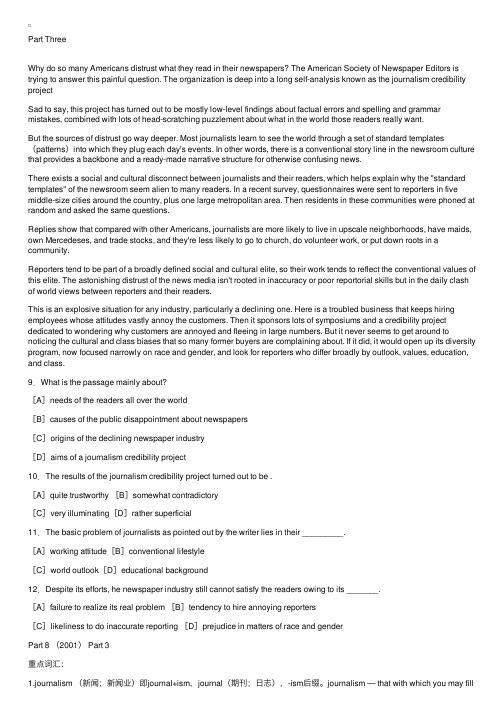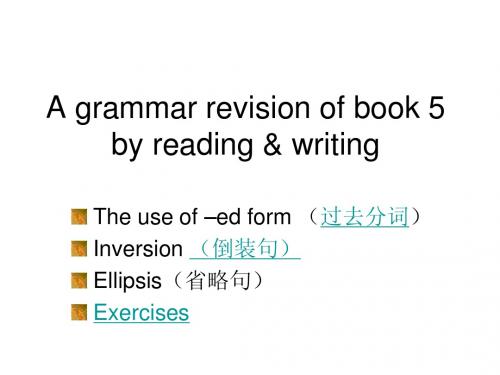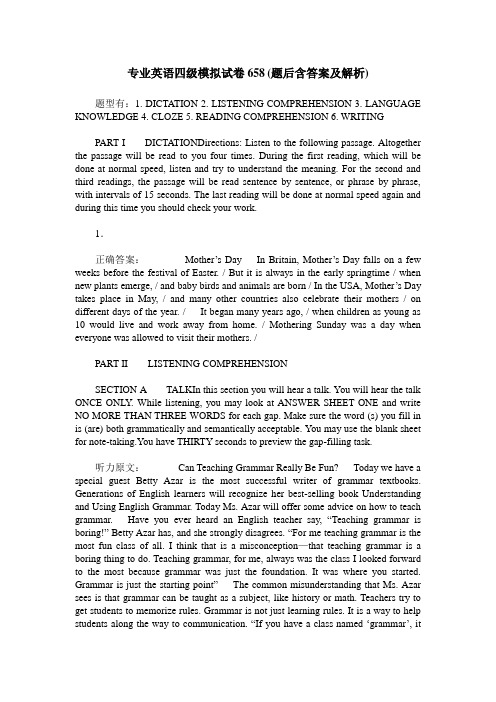Grammar(survey)
外研版高中英语必修二grammar

• 4.We must send these gifts now______________________ ( 目的是让我们的朋友收到它们) in time.
• 答案: for our friends to receive them
• 5.(湖南高考改编)__________________(为了保暖)at night, I would fill the woodstove,then set my alarm clock for midnight so I could refill it.
• 2.such...that...句型
• (1)such+a/an+形容词+可数名词(单数)+that从句 • He’s such a good person that we mustn’t blame him. • 他是这样好的人,我们不能怪他。
• (2)such+形容词+可数名词(复数)/不可数名词+that从句 • It is such nice weather that I would like to go to the beach. • 天气如此之好,我想去海滩。 • They are such fine teachers that we all hold them in great respect. • 他们是非常好的老师,我们对他们极为尊敬。
• (2)当目的状语从句中的主语与主句中的主语不相同时,要用 动词不定式的复合结构作状语。
• 我早点到来为了你在会前可以看我的报告。 • I came early in order that you might read my report before the
meeting. • I came early for you to read my report before the meeting.
考研英语历年阅读理解真题精析--2001年part3

Part ThreeWhy do so many Americans distrust what they read in their newspapers? The American Society of Newspaper Editors is trying to answer this painful question. The organization is deep into a long self-analysis known as the journalism credibility projectSad to say, this project has turned out to be mostly low-level findings about factual errors and spelling and grammar mistakes, combined with lots of head-scratching puzzlement about what in the world those readers really want.But the sources of distrust go way deeper. Most journalists learn to see the world through a set of standard templates (patterns)into which they plug each day's events. In other words, there is a conventional story line in the newsroom culture that provides a backbone and a ready-made narrative structure for otherwise confusing news.There exists a social and cultural disconnect between journalists and their readers, which helps explain why the "standard templates" of the newsroom seem alien to many readers. In a recent survey, questionnaires were sent to reporters in five middle-size cities around the country, plus one large metropolitan area. Then residents in these communities were phoned at random and asked the same questions.Replies show that compared with other Americans, journalists are more likely to live in upscale neighborhoods, have maids, own Mercedeses, and trade stocks, and they're less likely to go to church, do volunteer work, or put down roots in a community.Reporters tend to be part of a broadly defined social and cultural elite, so their work tends to reflect the conventional values of this elite. The astonishing distrust of the news media isn't rooted in inaccuracy or poor reportorial skills but in the daily clash of world views between reporters and their readers.This is an explosive situation for any industry, particularly a declining one. Here is a troubled business that keeps hiring employees whose attitudes vastly annoy the customers. Then it sponsors lots of symposiums and a credibility project dedicated to wondering why customers are annoyed and fleeing in large numbers. But it never seems to get around to noticing the cultural and class biases that so many former buyers are complaining about. If it did, it would open up its diversity program, now focused narrowly on race and gender, and look for reporters who differ broadly by outlook, values, education, and class.9.What is the passage mainly about?[A]needs of the readers all over the world[B]causes of the public disappointment about newspapers[C]origins of the declining newspaper industry[D]aims of a journalism credibility project10.The results of the journalism credibility project turned out to be .[A]quite trustworthy [B]somewhat contradictory[C]very illuminating[D]rather superficial11.The basic problem of journalists as pointed out by the writer lies in their _________.[A]working attitude[B]conventional lifestyle[C]world outlook[D]educational background12.Despite its efforts, he newspaper industry still cannot satisfy the readers owing to its _______.[A]failure to realize its real problem [B]tendency to hire annoying reporters[C]likeliness to do inaccurate reporting [D]prejudice in matters of race and genderPart 8 (2001) Part 3重点词汇:1.journalism (新闻;新闻业)即journal+ism,journal(期刊;⽇志),-ism后缀。
Grammar(Book 5)复习

(surprise)
过去分词作表语
过去分词作定语: The United States is a developed country. …a country which has developed.
He found that it came from the river polluted by dirty water. …the river which was polluted by dirty water.
A grammar revision of book 5 by reading & writing
The use of –ed form (过去分词) Inversion (倒装句) Ellipsis(省略句) Exercises
was shocked 1. Everybody ____________to hear the death of the famous film star.
1. Never before have I seen such a beautiful painting. 2. Only after the competition did I realize that I did wrong to him. 3. Not until I experienced the problem myself did I believe what Mr Green said. 4. Not only is he good at photography, but (also) at painting. 5. Had he not told me about that, I would have lost the competition. 6. No sooner had I reached home than it began to rain. .
大学英语重点grammar2

have thought he was safe from in the bosom of his family: “Please give me your autograph.”
再看名定实状之例:
精品PPT
You must excuse us, doctor, we have her in the kitchen where it is warm.
language; 3) powerful observation and analysis of language.
3. 外语(wàiyǔ)学习
精品PPT
4. 现状 II.语法教学的过程 1. 语法学习方法(fāngfǎ)介绍
精品PPT
语法课旨在帮助(bāngzhù)学生唤起语法意识、梳理原有 的知识,进一步介绍知识,指导学生进行归纳总结,进 而对英语语法有一个系统的掌握,提高其语法运用的能 力。
In recent years, the Awareness-raising approach has been suggested as an innovation on language teaching.
Language Awareness (LA) aims to develop a person’s sensitivity to and awareness of language, to understand how language relates to the most central activities in our life from learning to thinking and to social relationship, and to build up the ability to view a language objectively as a phenomenon. LA may act as a bridge to better language learning and as a prerequisite for efficient language study. In other words, LA is able to serve as a principled process or mechanism that will allow students to capitalize on their knowledge of English for communicating and learning purposes. Students are expected to develop:
Grammar

Word Study
1) mistaken: wrong in opinion 不正确的;理解错误的 不正确的; 2) narrow: not wide; not far from one side to the other 狭窄的 3) consist: be made up of something 由……组成 组成
宾语从句: 宾语从句: 连词: 连词:that, whether,if who, what, which, whoever, , whatever when, where, how, why. e.g. I wonder who you are. I find it necessary that we should do the homework. 特殊宾语从句: 特殊宾语从句: 1. I’m interested in what you are saying.
4. Some people feel that Wales is an ancient fairy land. (Predicative Clause表语从句 表语从句) 表语从句 5. That most of these are now threatened and may disappear is a serious matter to the people in Britain. (Subjective Clause主语从句 主语从句) 主语从句
表语从句 作用:对主语进行解释说明。 作用:对主语进行解释说明。 连词: 连词:that, whether,what, who,why等等 , , , , 等等 as if, as though也可以用来连接。 也可以用来连接。 也可以用来连接 1.What I want to say is _____ you like best. a. that b. whether c. which
专业英语四级模拟试卷658(题后含答案及解析)

专业英语四级模拟试卷658(题后含答案及解析)题型有:1. DICTATION 2. LISTENING COMPREHENSION 3. LANGUAGE KNOWLEDGE 4. CLOZE 5. READING COMPREHENSION 6. WRITINGPART I DICTATIONDirections: Listen to the following passage. Altogether the passage will be read to you four times. During the first reading, which will be done at normal speed, listen and try to understand the meaning. For the second and third readings, the passage will be read sentence by sentence, or phrase by phrase, with intervals of 15 seconds. The last reading will be done at normal speed again and during this time you should check your work.1.正确答案:Mother’s Day In Britain, Mother’s Day falls on a few weeks before the festival of Easter. / But it is always in the early springtime / when new plants emerge, / and baby birds and animals are born / In the USA, Mother’s Day takes place in May, / and many other countries also celebrate their mothers / on different days of the year. / It began many years ago, / when children as young as 10 would live and work away from home. / Mothering Sunday was a day when everyone was allowed to visit their mothers. /PART II LISTENING COMPREHENSIONSECTION A TALKIn this section you will hear a talk. You will hear the talk ONCE ONLY. While listening, you may look at ANSWER SHEET ONE and write NO MORE THAN THREE WORDS for each gap. Make sure the word (s) you fill in is (are) both grammatically and semantically acceptable. You may use the blank sheet for note-taking.You have THIRTY seconds to preview the gap-filling task.听力原文:Can Teaching Grammar Really Be Fun? Today we have a special guest Betty Azar is the most successful writer of grammar textbooks. Generations of English learners will recognize her best-selling book Understanding and Using English Grammar. Today Ms. Azar will offer some advice on how to teach grammar. Have you ever heard an English teacher say, “Teaching grammar is boring!” Betty Azar has, and she strongly disagrees. “For me teaching grammar is the most fun class of all. I think that is a misconception—that teaching grammar is a boring thing to do. Teaching grammar, for me, always was the class I looked forward to the most because grammar was just the foundation. It was where you started. Grammar is just the starting point”The common misunderstanding that Ms. Azar sees is that grammar can be taught as a subject, like history or math. Teachers try to get students to memorize rules. Grammar is not just learning rules. It is a way to help students along the way to communication. “If you have a class named ‘grammar’, itdoesn’t mean you’re teaching rules that the students have to learn. It just means, grammar is where we’re going to start, and then we’re going to have a lot of fun with it, and practice, and do a lot of interesting things, and most importantly, have successful communication experiences. Those are the building blocks of learning a second language.” A piece of advice for teachers is that students do not all learn in the same way. Each may have a different learning style when it comes to learning grammar. Some may see a pattern and understand the rule. Others need more explanations and practice. Another piece of advice for teachers is to understand their students’ language backgrounds. If the students have a native language with a similar grammar rule, they do not need to spend time practicing it in English. “But to teach grammar as a subject matter and test it as though you were testing the memorization of dates in history is sure to bore everybody and not reach the goals that you are trying to reach—successful communication experiences.”Some teachers hate teaching grammar. Why? Because grammar was removed from the regular course of study in the U.S. and U.K. in the 1960s, most native speakers of English did not learn it in school. Ms. Azar imagines that many teachers are not comfortable teaching grammar because they do not know how to answer their students’ questions. “We now have an entire pool of possible teachers who don’t know the grammar of their own language. If you don’t know any grammar of your own language, and then you are asked to teach it, you walk into a class: very likely your students may know more grammar than you know, and you cannot answer their questions. You’re going to have hostility towards teaching grammar.”An organization called The International Research Foundation for English Language Education(TIRF)has been doing long-term studies of ESL students. TIRF’s research reports that teaching grammar along with communication is effective.Can Teaching Grammar Really Be Fun?【T1】______ among average teachers【T1】______■Teaching grammar is boring■Grammar can be taught as a 【T2】______【T2】______■Get students【T3】______ rules【T3】______Betty Azar’s view of grammar■The starting point and【T4】______【T4】______■Enables students to experience better【T5】______【T5】______Advice for teachers ■To know the different【T6】______ of each student【T6】______■To realize students’【T7】______【T7】______Reasons for some teachers’【T8】______ of teaching grammar【T8】______■Some teachers don’t know grammar and may fail to【T9】______【T9】______TIRF’s research■Teach grammar with communication is【T10】______【T10】______2.【T1】正确答案:Misconception / Misunderstanding3.【T2】正确答案:subject4.【T3】正确答案:memorize / learn5.【T4】正确答案:the foundation6.【T5】正确答案:communication7.【T6】正确答案:learning style8.【T7】正确答案:language backgrounds9.【T8】正确答案:hatred10.【T9】正确答案:answer students’ questions11.【T10】正确答案:effectiveSECTION B CONVERSATIONSIn this section you will hear two conversations. At the end of each conversation , five questions will be asked about what was said. Both the conversation and the questions will be spoken ONCE ONLY. After each question there will be a ten-second pause. During the pause, you should read the four choices of [A], [B], [C] and [D], and mark the best answer to each question on ANSWER SHEET TWO.You have thirty seconds to preview the questions.听力原文:M: Hi. Mary. How are you?W: Fine, thanks. How are things going? With the presentation, I mean.M: Not too bad, actually. I found that survey you sent me really useful.W: The one about young people and mobile phones?M: Yes. It showshow incredibly important mobile phones are to young people. For example, did you know that 75 percent of teenagers use their phones at least once a day? W: 75 percent! That’s quite a lot. M: But actually texting is an even bigger thing with young people nowadays. About 90 percent of them send at least one text massage a day. And if you look at the UK as a whole, people are sending over 2 billion text messages a month. What’s so amazing is that they’ve gone from zero to 2 billion in such a short time. W: That’s an amazing increase. You know, we could design a graph to show that. M: Great idea! By the way, what do you think the peak time for sending text messages is? W: I don’t know. Seven thirty? Eight o’clock at night? M: Well, it is at night but apparently it’s between ten thirty and eleven. W: That’s quite late. I’m surprised. M: What you have to remember about mobiles is that they’re part of young people’s self-expression and part of their identity. The most popular place you carry your phone is in your pocket. And the last place you should keep your phone is on your belt. That’s a really big fashion mistake for most of the teenagers in the survey anyway. Now, you were going to talk about the different functions of mobile phones, Mary, weren’t you? Which functions did you decide to cover? W: Well, the most popular, obviously, is text messaging. But you seem to have a lot of information on that already. So I will leave that to you, if that’s OK M: Fine, so you won’t cover text messaging, but...? W: I think video is still a pretty specialized thing at the moment. Not that many phones have it yet. So I’m not covering that. But the other thing I’m going to look at is voicemail. It’s not quite as popular with teenagers as the other functions but about two thirds still use it. M: OK. Let’s talk about it next week.1. What do we learn from the conversation about the survey sent by the woman?2. According to the man, what is the bigger thing with young people today?3. What does the man think the peak time for sending text messages is?4. According to the man, what is the least popular place to carry the phone?5. Why won’t the woman cover video?12.A.It has nothing to do with the man’s presentation.B.It focuses on young men and mobile phones.C.It shows how important mobile phones are to the old.D.It shows 70% of teenagers use their phones once a day.正确答案:B13.A.Making phone calls to their friends.B.Sending text messages.C.The graph they would design.D.Losing part of their identity.正确答案:B14.A.He is not sure about it.B.He thinks it’s 7:30pm or 8:00pm.C.He thinks it’s between 10:30pm and 11:00pm.D.He thinks it’s between 7:30pm and 11:00pm.正确答案:C15.A.On the belt.B.In the pocket.C.In the handbag.D.In the schoolbag.正确答案:A16.A.Because she thinks voicemail is a better topic.B.Because she thinks video is out of date.C.Because she thinks there are not enough video users.D.Because many phones doesn’t have the function yet.正确答案:D听力原文:M: Hi, I’m from the Students’Union. We’re doing a survey of students’eating habits. Is it all right if I ask you a few questions?W: Will it take long?M: No, not really. Five minutes maybe? There aren’t all that many questions.W: And what’s it for exactly?M: Well, we wanted to get an idea of the sort of things students eat on a regular basis, and find out how aware people are about diet and nutrition. The idea is to produce an information leaflet about healthy eating. W: Yes, I suppose something like that would be quite useful, a leaflet I mean, especially for new students. Anyway, what do you want to know, exactly? M: OK, first question. What would you say your favourite food is? W: That’s easy. A burger and chips. Lots of chips! I must say I like a nice Chinese meal as well, and maybe spaghetti once in a while... But no, the best has got to be a burger. M: OK, and what’s your least favorite food? W: Let me think. I’ve never been that keen on cauliflower, or fish—the smell puts me off. But no, the thing I really can’t stand is salad Rabbit food, I call it. I know lettuce and things are supposed to be healthy and all that, but it’s just not a real meal, is it? M: Mmm. You’re getting into some bad habits there, you know. Anyway, moving on... Let’s take a typical day. How many meals do you have? I mean proper sit-down meals, not snacks. W: Well, I nearly always oversleep, which means I generally skip breakfast altogether. And then I’d probably just have a bar of chocolate for lunch. So in answer to your question, I don’t sit down to a proper meal till the evening. M: OK Typical student. I suppose! And the next question: How many eggs would you eat in a week? One? Two? W: Well, I don’t do much cooking as a rule, butevery Sunday I make myself a nice fried breakfast as a treat. That’s sausages, bacon and two eggs. Lovely! M: That sounds OK once a week. But I wouldn’t recommend it on a regular basis. Too much fat. And how about fresh fruit? Does it figure in your diet at all? W: Not really, well, I know it’s bad, but... I’m just not in the habit really. I suppose I might eat an apple once in a blue moon. M: Pity. But I suppose it’s better than nothing! And would you say you had a sweet tooth. W: I guest so. Well, most people have, haven’t they? Me, I can’t resist a bar of chocolate.6. What does the man want to find out?7. What can we learn from the conversation about the woman’s eating habit?8. Why does the woman usually skip breakfast?9. What does the man think of the woman’s fried breakfast?10. How often does the woman eat apples?17.A.How students care about the information on the leaflet.B.What kind of food the woman eats.C.To what extent people care about diet and nutrition.D.Whether the woman has developed a good eating habit or not.正确答案:C18.A.She likes burgers best.B.She never eats spaghetti.C.She likes to eat cauliflower.D.She eats what is thought healthy.正确答案:A19.A.She is too busy to have breakfast.B.She prefers a bar of chocolate to breakfast.C.She gets up too late.D.The smell of breakfast puts her off.正确答案:C20.A.It contains too many eggs.B.It is too fatty.C.It is OK on a regular basis.D.It is nutritious.正确答案:B21.A.Once in a while.B.Once in a moon.C.Seldom.D.Once a day.正确答案:CPART III LANGUAGE KNOWLEDGEThere are twenty sentences in this section. Beneath each sentence there are four words, phrases or statements marked [A], [B], [C] and [D]. Choose one word, phrase or statement that best completes the sentence.22.He was found the right man for the job. The italicized part functions as a(n)_____ in the sentence.A.subject complementB.objectC.adverbialD.object complement正确答案:A解析:考查主语补足语。
- 1、下载文档前请自行甄别文档内容的完整性,平台不提供额外的编辑、内容补充、找答案等附加服务。
- 2、"仅部分预览"的文档,不可在线预览部分如存在完整性等问题,可反馈申请退款(可完整预览的文档不适用该条件!)。
- 3、如文档侵犯您的权益,请联系客服反馈,我们会尽快为您处理(人工客服工作时间:9:00-18:30)。
Grammar, We Are Coming!
Part1 Have a try
( ) 1. He often has ________ egg and some milk for breakfast.
A. / B. a C. the D. an
( )2. ---What’s the trouble with Lingling?
---She doesn’t go to________ school and stay in _____bed now.
A. a; / B. the; the C. /; / D. /; a
( )3. ---Do you have _______ dictionary?
---No, but Lucy has ______ new dictionary on the bookshelf.
A. a; the B. the; the C. the; a D. a; a
( )4. _______ earth is round.
A. A B. An C. The D. /
( )5. There is _______ “L” in the word “LUCK”.
A. a B. the C. an D. /
6. Could you tell me something _______ WWF? I am really interested in animals.
7. Cindy usually goes to school ______ eight o’clock.
8. Jack is shorter than Sam, but Jack is sitting _________ Sam.
9. Marcia’s grandmother is _______ ninety years old. She is very healthy now.
10. Can you help me_____ my math? It’s too difficult for me.
11. The picture of my family is _______ the wall.
12. We live _____ London. How about you? Where do you come _____?
13. _____ Sunday morning, I usually sleep late _____ home.
14. This is my uncle. We often visit ______ (he).
15. ______ (We) math teacher is very kind to us.
16.______(她)brings______(它们)to_______(我们)
17.Does____(他)give_______(它)to_____(他)?
18.---Whose bike is this? ---It’s______(她的).
19写出下列单词的第三人称单数形式。
have study do play teach watch fly like pay be say buy
20. You ___from India. Brian ___from Korea. And I ___ from China. (be)
21. I __ Chinese and English. Brian ___ German, Chinese and English. (speak)
23. --- What ______ your mother ______ now?
---She _______ (cook) some nice food now.
24. Look! The girls ______ (practice ) dancing in the classroom.
25. Some of the girls are ______ (water) the flowers now.
26. It’s six o’clock now. Our family ______ (have) supper at home.
27. 将下列句子改为一般疑问句, 并作肯定和否定两种回答。
Dogs live in all parts of the world.
28. 将下列句子改为否定句。
Egypt has a very long river.
Part2 Survey
1. Which parts are you good at?
名词的单复数变化 ( ) 冠词a, an, the ( )
介词的应用(at, in, on, of…)( ) 基数词与序数词(一,第一等) ( )
一般现在时 ( ) 一般过去时 ( )
现在进行时 ( ) 代词(this, that, hers, theirs…) ( )
其他( )
2. Which parts are unfamiliar to you? Write them down, please!
